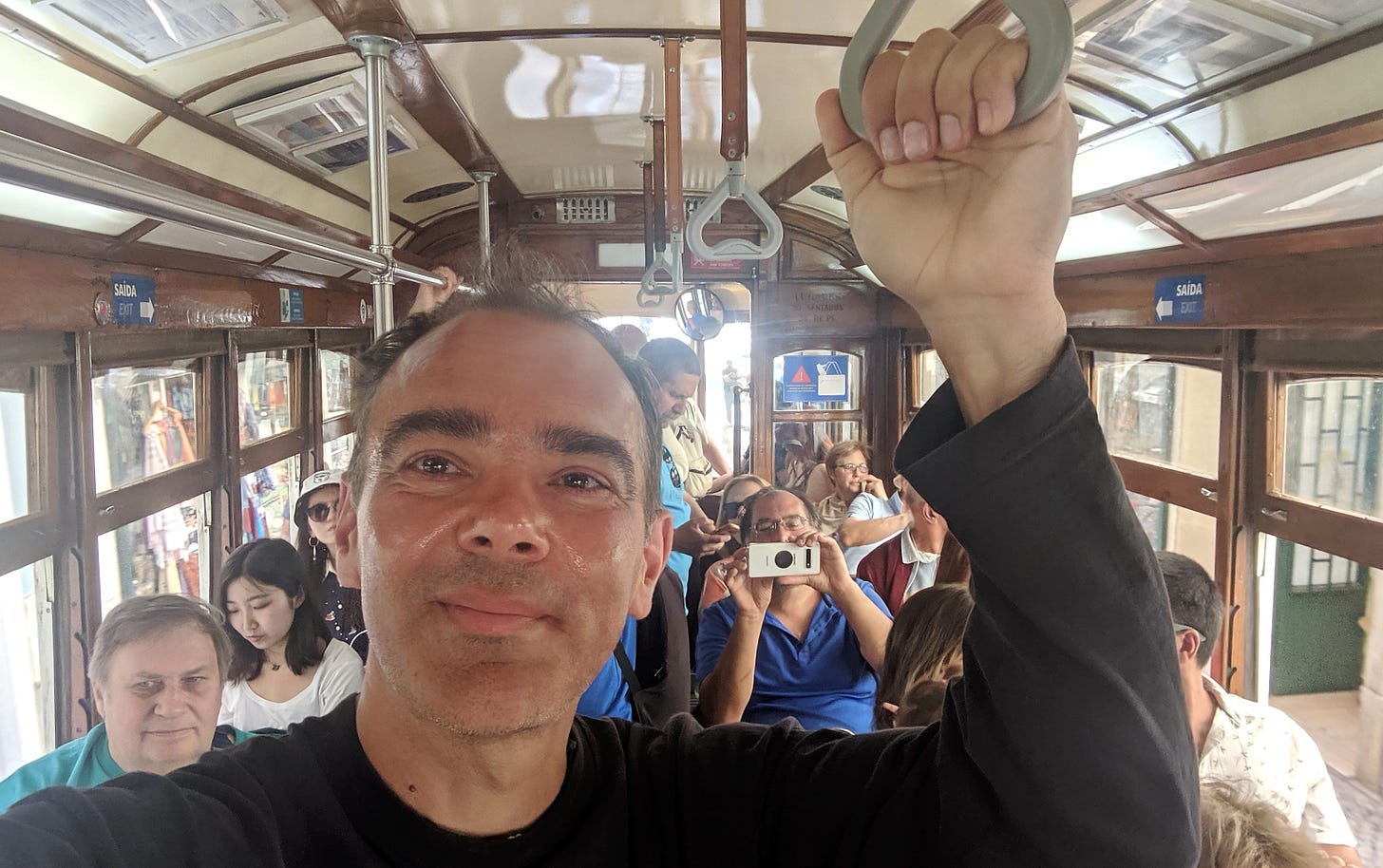Founded in July 1949 by the US-American conscientious objector Bob Luitweiler, the non-profit organization “Servas International” is dedicated to bringing together travelers and hosts from all over the world. Interpersonal encounters are to prevent prejudices and build understanding, tolerance and world peace.
This is the translation of an article I wrote on the 70th anniversary of Servas five years ago. A RadioTravel story on the 75th anniversary is in the making. I myself have been a Servas member since 2018 and have had the most amazing and touching encounters with fellow members. Here, two members from Germany share their experiences:
“I'm flying to the United States in two months,” Markus Kunert had told all his friends and acquaintances. “Then why don't you become a member of Servas?” a friend recommended to him when they met at the sports club. That was 30 years ago. Isolde Lederer also found out from a friend shortly before her trip to Australia that you can get to know locals off the beaten track through Servas and even stay with them in their homes. “I thought, that's exactly what I used to do when I was still a student.”
Both Isolde and Markus brought back many stories of surprising and astonishing encounters from their travels. Markus, for example, about the 80-year-old American who used to travel a lot in Europe. They soon found out that these included many places that Markus also knew. “I found it very exciting to talk about the same places and to see them with this huge difference in time.”
Isolde still remembers a fashion show near Cape Town. Instead of slender young models with trained hips, women of all ages and figures presented colorful dresses they had sewn themselves. Many were mature, round “mamas”. And they all had fun. Isolde was quite amazed. Her Servas hostess had taken her to the event and also introduced her to a social worker who took Isolde to her workplace in a home for the disabled in a township the next day. “I would never have been able to get there as a normal tourist.
Servas is all about encounters like these. The non-profit organization was founded in July 1949, in the shadow of the Second World War and shortly after the United Nations, by a group of students led by the American pacifist and conscientious objector Bob Luitweiler in Denmark. Initially, the network mainly provided impoverished Germans with free accommodation abroad. Through contact with people from other nations, they were to free themselves from possible Nazi ideology.
The concept was soon extended to other countries, as the core idea is universal: when people get to know each other, they are less likely to wage war against one another. Servas nowadays has 15,000 members in more than 100 countries and has had observer status at the United Nations since 1973. The name goes back to the Esperanto word “Servas” for “service”. The aim is to bring people of different origins, world views, skin colors and religions together. You can be a traveler or a host.
Isolde Lederer and Markus Kunert have been both for more than twenty years. At the time of his first trip to the USA, Markus still lived in a student dormitory in Berlin, but now he has a family and enough space in his apartment to accommodate guests. At the age of 50, he also travels less than he used to. “I think it's great to welcome the world home as a host.” For example, the 90-year-old lady from London who comes to Berlin every year for the International Film Festival, the “Berlinale”. Or the young Italian woman who Markus took to his mother's birthday party. The idea of Servas is that getting to know each other only works if you spend time together.
And that can be quite exhausting. “You have to have a basic interest in other people and ways of life,” says Markus. Conversations are often very intense. Because instead of talking about the latest movie, people are quick to talk about very private things that move them emotionally. The comfort of the accommodation varies considerably. Markus has already slept on sofas in eat-in kitchens and in a room together with four brothers. “It's not about whether I have a room with a sea or mountain view. People invite you into their own home. And that's the way it is,” Isolde sums it up.
The experience you have gained as a traveler helps you to be a good host. And vice versa. “I know what it feels like when someone eats the fridge empty without having asked for permission.” The hosts set the rules for the stay. They also decide whether someone can stay longer than two nights. “It depends on whether the chemistry is right,” says Isolde. No one is forced to take in a guest. Both sides can break off a stay at any time if one feels uncomfortable with the other. Of course, there are sometimes misunderstandings. “In one culture, shaking your head means NO, in another you click your tongue. You can learn from that.”
Traveling with Servas has long since ceased to be a classic “peace mission” as it was in the early days. It is rare for an Iranian and an Israeli to talk about their family histories and how they experience the conflict in the Middle East, as they do at an international members' meeting. “Yet every encounter is also a message of peace,” says Isolde. One guest from Rwanda who traveled via Servas, for example, reported on a project for men against male violence in his home country. “Thinking outside the box is simply a great enrichment.”
Servas is a non-profit platform, which distinguishes it from others such as AirBnB and Couchsurfing. The focus there is on finding a place to stay. Interpersonal encounters are more of a side effect. With Servas, it's exactly the opposite. That's why neither the placement nor the accommodation itself costs anything. There is also no online rating system. “You have a lot to say to some people, with others it's more superficial. How do you evaluate that?” explains Isolde Lederer.
Commitment, security and trust, on the other hand, are very important at Servas. Anyone who wants to become a member must undergo a personal interview in which a trained “interviewer” explains the organization's goals and working methods. Isolde Lederer and Markus Kunert have become interviewers themselves. They not only check the personal details, but also try to clarify the following during the interview: “Can the person who wants to become a member adapt to others? Are they willing to open up?” The “Letter of Introduction”, a short self-presentation with a photograph that every applicant must bring with them, also provides a first impression.
If the conversation is successful, you are given access to the member list. As a traveler, you can now search for your preferred host in the respective travel destination. In addition to the contact details, you can find out further personal information about the host, such as their profession, language skills or hobbies. Whether a host lives alone or with a family, and in which countries the “host” has already traveled. It is also described whether a sleeping bag is mandatory, whether the family has pets or accepts pets and the like. There are also “day hosts” who do not offer overnight accommodation, but only offer company during the day. Once you have chosen someone, you apply to be a guest, usually by email. Attached to the email is the profile you wrote for the interview. Conversely, the host or day host can also find out from the member list which traveler they are dealing with.
With around 2,000 members, the Servas Germany is one of the larger country sections. The board sometimes hears complaints from parents. The young adults say: “I'm going Couchsurfing, why should I do an interview?” At least the German section wants to stick with this practice. The personal contact is intended to help preserve the values and goals of the organization even in the age of Facebook, Instagram and Twitter [now X]. Nature conservation and environmental protection have been enshrined in the statutes. Travelers should leave as small an ecological footprint as possible. This is why the network uses donations to organize not only general meetings, but also international group meetings, youth camps and Alpine hikes. There are also regular regional meetings.
However, like Servas itself, many members are getting on in years. The organization still gains new members mainly through word of mouth. Many fear that this is no longer in keeping with the times. Isolde Lederer, now 63 herself, sees things differently: “The basic idea is great. Servas has had good experiences with it for 70 years. In this respect, it's a successful model.” Markus Kunert agrees with her. “Many young people who come to me for an interview have the same ideals as I had when I was 20.”
Servas Online, a global database, aims to make traveling easier and more attractive for younger people. There are many travel reports on the homepage. One young woman writes about her experiences in Japan, saying that the West-East encounter was somewhat difficult. For example, eating and sleeping on the floor. “And nowhere did I find sweets that were sweet enough for me. But in the end I enjoyed everything that was part of the learning and adventure.”
Two years ago, Markus Kunert and his family were guests of a British farmer who lives as a self-sufficient farmer. “A completely different way of life. I thought it was great to show my children this diversity.” His son, now 18, is currently traveling in Australia with his girlfriend. With Servas, of course.
This text was first published in German in the magazine Publik-Forum (no direct link to the article available). I have slightly adjusted some sentences to avoid anachronism.
Servas Germany now has a new 1st chairman. The tenor for the future is said to be more optimistic, and the interviews are perceived positively by the young people.





